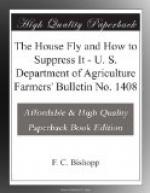DISPOSAL OF MANURE IN RURAL AND SUBURBAN DISTRICTS.
The control of flies in rural and suburban districts offers a much more difficult problem. Here it is often out of the question to remove all manure from the premises twice a week, and the problem is to find some method of disposal or storage which will conserve the fertilizing value of the manure and at the same time prevent all flies from breeding, or destroy such as do breed there.
With this idea in mind, it has been recommended that stable manure be collected every morning and hauled out at once and spread rather thinly on the fields. This procedure is advisable from the point of view of getting the maximum fertilizing value from the manure. Immediate spreading on the fields is said largely to prevent the loss of plant food which occurs when manure is allowed to stand in heaps for a long time. This method will be effective in preventing the breeding of flies only if the manure is hauled out promptly every morning and spread thinly so that it will dry, since it is unfavorable for fly development in desiccated condition. The proper scattering of the manure on the fields is best and most easily and quickly accomplished by the use of a manure spreader, and many dairies, and even farms, are practicing the daily distribution of manure in this way. Removal every three or four days will not be sufficient. Observations have shown that if manure becomes flyblown and the maggots attain a fairly good size before the manure is scattered on the fields, they can continue their development and will pupate in the ground.
CHEMICAL TREATMENT OF MANURE TO DESTROY FLY MAGGOTS.
During the summer months, when fly breeding is going on most actively, the farmer is also busy and often can not spare the time to remove manure regularly. The general practice, therefore, has been to keep the manure in heaps located, as a rule, very near the stables. How can fly breeding be prevented in such accumulations? As a result of recent investigations, it is now possible to point out two methods which are practical and effective.
The first is the treatment of the manure pile with chemical substances which will kill the eggs and maggots of the house fly. The Bureau of Entomology, in cooperation with the Bureau of Chemistry and the Bureau of Plant Industry, has conducted a series of experiments in which a large number of chemicals were applied to infested manure and observations made, not only on their efficiency in killing the maggots but also as to their effect on the chemical composition and bacterial flora of the manure. The object was to find some cheap chemical which would be effective in destroying the fly larvae and at the same time would not reduce the fertilizing value of the manure.




